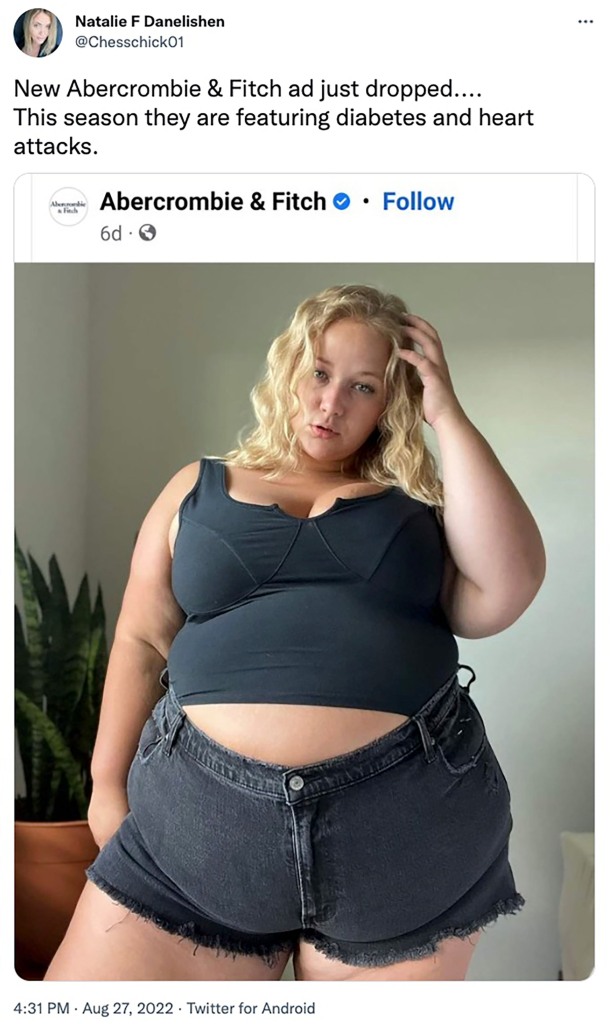Abercrombie sparks tweetstorm over ‘normalizing’ obesity
A consumer-generated image of a plus-sized woman posted to Abercrombie & Fitch’s social media account ignited a debate on whether the retail company was “normalizing” obesity and unhealthy eating habits in the name of body diversity and inclusion.
The image was initially posted last week on the company’s official Instagram account and went viral over the weekend, with Twitter commenters offering overwhelmingly negative reactions.
“New Abercrombie & Fitch ad just dropped…. This season they are featuring diabetes and heart attacks,” tweeted Natalie Danelishen.
“She has a pretty face, too bad society told her not only was it healthy to look like this but it was also brave and empowering,” wrote another Twitter user.
The company said the image was not an ad.
“Abercrombie is often tagged by our customers on social media and we love to celebrate them by reposting their images to our channels,” a company spokesperson told The Post on Monday. “This is one of those occasions.”
Some Twitter users defended the posting, with one commenting: “Making clothes for people who are obese is a bad thing now?”
“No,” responded one Twitter user. “But Selling obesity as sexy/ attractive is counterproductive to the medical advisors selling obesity as extremely unhealthy.”
“And if it’s not unhealthy why don’t McDonalds, KFC etc use obese people in ads? Probably because it’s not attractive enough to be assoc. w/food.”


Fashion retailers such as Abercrombie and Victoria’s Secret have sought to appeal to a mass audience by eschewing advertising campaigns that have traditionally and exclusively featured thin models in favor of promotional content that touts body diversity and “body positivity.”
The use of skinny models by the fashion industry sparked accusations that it was encouraging young girls and women to adopt unhealthy eating habits in pursuit of an unrealistic body type.
But critics now say that the industry is swinging too far in the other direction by featuring plus-size models.



In 2003, Abercrombie was sued by 250,000 employees who allege they were discriminated against by being forced to work in stock rooms out of view of the public while sales jobs went to those who had the “look” prized by the company.
The company, which has traditionally marketed to predominantly white college-age kids, agreed to pay $40 million to settle the class-action lawsuit.
The United States has among the highest obesity rates in the developed world. Excess weight is though to be a leading contributor to health maladies including heart disease, stroke, high blood pressure, and diabetes.
Earlier this month, Bill Maher devoted a segment of his popular weekly HBO talk show “Real Time with Bill Maher” to what he called America’s transition from “fat acceptance” to “fat celebration.”
Maher said it was “disturbing” and “Orwellian” for people to disregard obesity as a health hazard.
He accused American thought leaders of “rewriting science to fit ideology to just fit what you want reality to be.”
“We’ve gone from fat acceptance to fat celebration. That’s new. That is new,” Maher said on his Aug. 5 broadcast.
“To view letting yourself go as a point of pride? We used to at least try and be fit and healthy and society praised those who succeeded.”
Read the full article Here


